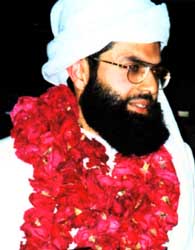|
|
|
Omar Saeed Sheikh. |
Senior al Qaeda operative Omar Saeed Sheikh plotted to kill Pakistan’s former president while serving a jail sentence and is also believed to be complicit in the murder of a senior Pakistani counterterrorism officer.
Omar plotted to kill former President Pervez Musharraf and Chief of Army Staff General Ashfaq Kiyani while serving a sentence at the Hyderabad Jail for the murder of Wall Street Journal reporter Daniel Pearl in 2002, The News reported. Senior US officials confirmed to The Long War Journal Omar’s role as the leader of what The News described as “a clandestine terror network.”
From prison, Omar called Musharraf on his personal cell phone in mid-November and threatened his life. “I am after you, get ready to die,” Omar reportedly told Musharraf. The plan was to ambush Musharraf’s convoy as he traveled between Army House in Rawalpindi and his farm outside of Islamabad or to blow up a bridge as he traveled to the airport.
Omar also phoned retired Major General Faisal Alavi, the former commander of Pakistan’s Special Service Group, just days before he was killed on Nov. 22. It is not currently clear Omar was behind Alavi’s murder, a senior US intelligence official told The Long War Journal. “We do suspect he was involved,” the official said.
As leader of the Special Service Group, Alavi was charged with hunting down al Qaeda and other terror groups operating inside Pakistan. Just four days before he was killed, Alavi sent a letter to General Kiyani, requesting that his honor be restored and threatening to expose the Army generals who conspired with the Taliban in the Northwest Frontier Province.
Alavi was killed while driving through the capital of Islamabad. A car blocked the road, stopping his car. “At least two gunmen opened fire from either side, shooting him eight times,” Times Online reported. His family and friends believe elements of Pakistan’s Inter-Service Intelligence agency and the military were behind the hit.
Omar conspired with Attaur Rehman, a Lashkar-e-Jhangvi leader who is also detained for involvement in the murder of Daniel Pearl. Rehman is serving time at the Sukkur Central Jail. He and Omar communicated via phone; police found several phones and communications devices that recorded calls made by Rehman and Omar to Lashkar-e-Jhangvi operatives in Karachi and Rawalpindi.
Omar and jihadi groups
The FBI believes Omar served as the bagman for the Sept. 11 attacks. He is thought to have he wired more than $100,000 to Mohammed Atta, the tactical commander of the Sept. 11 suicide teams. Atta then sent money not used in the operation back to Omar.
Omar is also a close associate of Maulana Masood Azhar, the leader of the Jaish-e-Mohammed terror group. Omar and Azhar were freed from Indian custody in 1999 after terrorists hijacked an Indian Airlines flight and forced it to land in Kandahar, Afghanistan.
He also has close links to the Kashmiri terror group Harakat-ul-Mujahideen, the Taliban, and Pakistan’s Inter-Service Intelligence agency. After the murder of Pearl, Omar is said to have turned himself in to his ISI handler. It is believed Omar’s death sentence has not been carried out because of his connections with the ISI.
“Al Qaeda operatives like Omar serve as key facilitators between al Qaeda and the Pakistani terror groups, as well as with supporting elements within the ISI and the military,” a senior US official said.
“The fact that Omar is able to plot attacks from jail is highly disturbing,” another official said. “He is one dangerous individual.”
Lashkar-e-Jhangvi and al Qaeda in Pakistan
The Lashkar-e-Jhangvi was formed in 1996 after splitting with the Sipah-e-Sahaba, a radical Sunni group behind sectarian attacks against Shia throughout Pakistan. The Lashkar-e-Jhangvi expanded its activities to include terror attacks against the Pakistani state. After Sept. 11, 2001, Lashkar-e-Jhangvi was one of two Pakistani terror groups banned by the Musharraf regime.
The size of the Lashkar-e-Jhangvi is unknown, but it is believed to have hundreds of members dispersed in small cells throughout Pakistan. The group maintains camps in South Waziristan, under the protection of Pakistani Taliban leader Baitullah Mehsud. Baitullah is known to have absorbed elements of the Lashkar-e-Jhangvi in Karachi and placed them under the command of a leader named Raheemullah.
Lashkar-e-Jhangvi has cooperated with al Qaeda in some of the most high-profile attacks inside Pakistan, including the March 3 bombing outside the US Consulate in Karachi. A US diplomat was killed in the suicide car bombing.
“Lashkar-e-Jhangvi serves as al Qaeda’s muscle inside Pakistan,” a US intelligence official told The Long War Journal. “Al Qaeda tasks them with hits; they have the foot soldiers and local organization to conduct attacks throughout Pakistan.”









3 Comments
His death sentence hasn’t been carried out because of his links to the ISI? Does this not continue to speak of what is wrong with the ISI. If his sentence had been carried out more than likely some innocent people would be alive today. Time to dismantle the ISI and start all over again!
The Thunder Run has linked to this post in the blog post From the Front: 12/19/2008 News and Personal dispatches from the front and the home front.
I have read this article several times and have found it quite disturbing – particularly with all the noise about closing Gitmo. I have not heard or read anything with the latest update on this guy anywhere else. I suppose that is what I should expect.